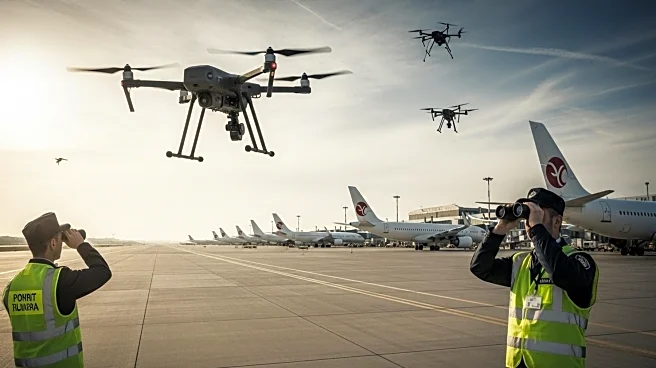What's Happening?
Munich Airport in Germany experienced significant disruptions due to drone sightings, leading to a temporary halt in flight operations. The airport's two runways were initially closed overnight into Friday, with operations resuming briefly before being halted again on Friday evening due to further drone activity. The airport reopened at around 7 a.m. local time on Saturday, affecting approximately 6,500 passengers with 23 flights diverted and 58 cancellations and delays. This incident is part of a broader pattern of unexplained drone sightings over civilian and military airports in Denmark, Germany, and Norway, raising security concerns across Europe. The sightings have prompted discussions among European leaders about enhancing security measures, including a proposed 'drone wall' initiative to detect and intercept drones.
Why It's Important?
The repeated drone sightings and subsequent airport disruptions highlight significant security vulnerabilities in European airspace, potentially impacting international travel and trade. The incidents have raised alarms about the ability of unauthorized drones to interfere with critical infrastructure, prompting European leaders to consider coordinated defense measures. The situation underscores the need for robust anti-drone technologies and international cooperation to safeguard airspace. The economic implications are considerable, as flight disruptions can lead to financial losses for airlines and inconvenience for passengers. Additionally, the geopolitical context, with suspicions of Russian involvement, adds a layer of complexity to European security dynamics.
What's Next?
European leaders are expected to convene to discuss the implementation of the 'drone wall' initiative, which aims to create a network of detection and interception systems across the continent. This initiative seeks to enhance the collective defense capabilities of EU member states against drone threats. The ongoing situation may lead to increased regulatory measures on drone usage and heightened security protocols at airports. Stakeholders, including airlines and security agencies, will likely collaborate to develop and deploy advanced technologies to prevent future disruptions. The outcome of these discussions could set a precedent for international drone regulation and airspace security.
Beyond the Headlines
The drone sightings and subsequent airport closures may have broader implications for civil liberties and privacy, as increased surveillance and security measures could impact personal freedoms. The situation also raises ethical questions about the use of drones in civilian areas and the potential for misuse by state and non-state actors. Long-term, the incidents could drive innovation in drone detection and defense technologies, influencing the future of airspace management and security policies.









